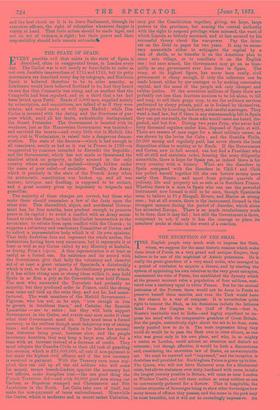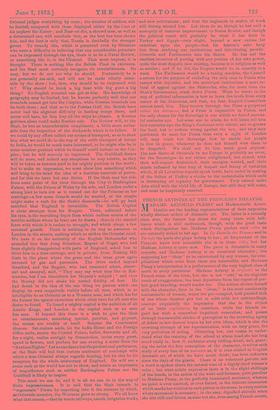THE RECEPTION OF THE SHAH. T HE English people very much
wish to impress the Shah, whom, we suppose for the same historic reasons which make them think of Persia as a very grand and antique Empire, they believe to be one of the mightiest of Asiatic potentates. He is really the great-grandson of a very small noble, who managed in a period of confusion to acquire a throne, and by starting the system of appointing his own relatives to the very great satrapies, commenced the ruin of Persia, but established the dynasty which at the present moment rules a population of four millions, scat- tered over a territory equal to twice France. But for the mutual jealousies of the Powers, there would not be force in Persia to preserve herself three months, and even the Turk would have a fair chance in a war of conquest. It is nevertheless quite right to honour the Shah, as his dominions include the Isthmus Road from the Caspian to the Gulf of Persia —that is, Russia's inevitable road to India—and highly expedient to im- press his mind with the comparative grandeur of Great Britain. But the people, instinctively right about the act to be done, seem sorely puzzled how to do it. The most impressive thing they could do would be to pass the Shah over in utter silence, as one who was great only in his own place, and who, in so mighty a centre as London, could attract no attention and disturb no interests ; but though effective, it would be both a discourteous and, considering the unwritten law of States, an unwarrantable act. He must be received and " impressed," and the reception is doubtless well provided for. Buckingham Palace is given up to him. The Queen, who will not leave Balmoral even for a Ministerial crisis, but allows statesmen over sixty, burdened with cares, to take the longest journey possible in Britain, will come as near London as Windsor Castle, and will there collect as many soldiers as can be conveniently gathered for a Review. That is hospitable, the routine etiquette of Sovereigns being to show other Sovereigns how many means of offence they possess, and the scene in the park may be most beautiful, but it will not be exceedingly impressive. An
Oriental judges everything by mass ; the number of soldiers will be limited, compared with those displayed either by the Czar or his nephew the Kaiser ; and Nasr-ed-din, a shrewd man, as well as a determined one, will conclude that, as the best has been shown him, and the beat is only that, Russia is decidedly the stronger power. To remedy this, which is perceived even by Ministers who have a difficulty in believing that any considerable potentate can be impressed through the eye, there is to be a Naval Review, or something like it, in the Channel. That must impress, it is thought. There is nothing like the British Fleet in existence, and the Shah must certainly recognise its irresistibleness. He may, but we do not see why he should. Fortunately he is not personally sea-sick, and will not be made utterly miser- able by the show ; but, then, why should he be impressed with it ? Why should he think a big boat with big guns a big thing? No English ironclad can get at him. His knowledge of geography may be limited, but he knows perfectly well that our ironclads cannot get into the Caspian, while Russian ironclads can be built there ; and that as to the Persian Gulf, the British have never had the slightest difficulty in landing troops there, and never will have, let him buy all the ships he pleases. A Russian garrison alone could make Bushire safe. The Review will, to the Shah, be but an uncomfortable compliment, a little more endur- able than the inspection of the dockyards which is to follow. If we could by any effort collect our means of transport, so as to show him what we could do in the way of the swift transport of troops to India, he would be much more interested, as he might also be in some monitor gunboat which he himself could imitate on the Cas- pian ; but he will scarcely be impressed. The Guildhall dinner will do more, and indeed any receptions he may receive, as they will be taken as honours paid to his mighty position in the world ; but to make an impression, we must show him something which will bring to his mind the idea of a limitless reservoir of power, and for this we have but one device. If the Shah may but ride from some point of the river through the City to Buckingham Palace, with the Prince of Wales by his side, and London under a strong hint to turn out as it turned out for the Princess on her marriage—a few more Guards would be wanted, or the roughs might make a rush for the Shah's diamonds—he will go back satisfied that England is irresistible. The British Capital is alone stronger than his Empire. There, collected before his eyes, is the recruiting depot from which endless armies of the terrible soldiers whom he fears can be drawn ; there is the massed force with which it is useless to struggle, and which obeys a few mounted guards. There is nothing in its way so awesome as London in the streets, nothing which so strikes the Oriental mind. We have it on the authority of the English Mehtnandar who attended him that Jung Bahadoor, Regent of Nepal, who had been slightly disappointed with parts of England, asked him to drive him in a close carriage, and in private, from Notting Hill Gate to the place where the grass and the trees grew again unvexed by gas and pavement. The drive ended beyond Stratford, and the Regent, who had remained silent, observ- ant and annoyed, said, " They may say what they like in Kat- mandoo, but I am henceforth her Majesty's subject ; " and even the Mutiny did not shake his rooted fidelity of fear. He had drunk in the idea of the one thing we possess which can display its own magnitude visibly before all men, which is as intelligible to an Oriental as to a Western man, and which has for the former the special attraction which cities have for all men who desire to found. To found a mighty capital is the ambition of all Asiatic Kings, and London is the capital such as no man has seen. If beyond this there is a wish to give the Shah an entertainment, something special, peculiar, and piquant, the means are readily at hand. Surpass the Continental dinners. Set custom aside, let the India House and the Foreign Office unite, secure the Crystal Palace, ballet, fireworks and all, for a night, realise sunlight by illumination, invite every guest, spend in flowers, and produce for one evening a scene from the "Arabian Nights." Let no one dance but the professional performers, or the Shah will feel that curious sentiment of contempt with which a true Oriental always regards dancing, but let this be his reception for the whole aristocracy of England. Ile will see a scene such as the world has not to show, and retain an impression of magnificence such as neither Buckingham Palace nor the Guildhall is likely to inspire.
This much we can do, and it is all we can do in the way of State impressiveness. It is said that the Shah intends to " regenerate " Persia by importing into it the sciences by which, as Orientals conceive, the Westerns grow so strong. We all know what that means,—that he wants railways, canals, irrigation works,
and new cultivations ; and that the engineers in search of work will throng around him. Let them do so, though he has sold a monopoly of material improvement to Baron Reuter, and though the political result will probably be what it has been in Turkey and Egypt—very slight, beyond a new excuse for exactions upon the people—but for heaven's sake keep him from studying our institutions and introducing pseudo- Councils and Parliaments into his States. He has not the smallest intention of parting with any portion of his own power, quite the most despotic now existing, because it is religious as well as secular ; and if he did, the Empire would be in anarchy in a week. The Parliament would be a taxing machine, the Council a screen for the purpose of secluding the only man in Persia who cannot wish injustice, and the municipal institutions a mere re- fusal of appeal against the Shabzadas, who, far more than the Shah's Government, crush down Persia. What he wants in the way of political information is how to learn the truth from every corner of his .dominions, and that, we fear, English Councillors cannot teach him. They receive through the Press a perpetual cahier des doleances, but a Press is impossible in Persia, and the only chance for the Sovereign is one which we found success- ful centuries ago. Let some one to whom he will listen tell him how centuries ago the King's Justiciars rode circuit, not to govern the land, but to redress wrong against the law, and they may perchance do more for Persia than even a sight of London will, may teach her Sovereign how to enable her people to live in peace, whenever he does not himself wish them to be despoiled. We shall not do him much good anyhow. The new desire of Orientals to see Europe is probably an error, for the Sovereigns do not return enlightened, but cowed, with their self-respect diminished, their energies wasted, and their minds inflamed by that fury of despair and frenzy of imitation which, if all Levantine reports speak truth, have ended in making of the Sultan of Turkey a victim to the melancholia which ends in destroying all capacity for government. They cannot make Asia vivid with the vivid life of Europe, but still they will come, and must be hospitably received.



































 Previous page
Previous page